How can we understand, unpack and process the emotions that we think of as jealousy?
This article focuses on jealousy experienced as strong emotions and feelings. Click here to read about how our minds and thoughts influence our experience of jealousy.
Our emotional response can be about socialised expectations but that does not mean that it is easy to untangle these. Those expectations ultimately lead to constrained core beliefs about ourselves. Our insecurities and past experiences can also manifest as jealous reactions.
There are only two emotions: love and fear. All positive emotions come from love, all negative emotions from fear. From love flows happiness, contentment, peace, and joy. From fear comes anger, hate, anxiety and guilt. It’s true that there are only two primary emotions, love and fear. But it’s more accurate to say that there is only love or fear, for we cannot feel these two emotions together, at exactly the same time. They’re opposites. If we’re in fear, we are not in a place of love. When we’re in a place of love, we cannot be in a place of fear.
Elisabeth Kübler-Ross
When thinking of jealousy, I think of the space that is between love and fear. Kubler-Ros says it is not possible to be in both places at the same time, and I think that our effort to do that, creates the conflict that we experience as jealousy. On one hand, there is the love we feel towards our partner, our relationship. On the other hand, we have fear of being alone, being unloved. This fear creates anxiety, anger and resentment. Love insists on keeping us tethered to the relationship, so jealousy becomes the result of this union.

The different emotions that we group under ‘jealousy’
As we feel into what happens to our body and our mind when we experience these emotions, we can begin to unpack years and decades of unresolved issues around our need for safety, security and love.
- Envy is when you want what someone else has, sometimes to take it away from them, other times to also have what they have. It represents a need to make up for a lack. Feel into what that lack is rather than trying to think it, and unlock the insecurity behind it. It could be that you are conflating what your partner does with others, or material gifts, with a real need for love, affection or affirmation.
- Fear of abandonment kicks in when you have an insecure attachment style that is anxious or avoidant. You are afraid of new and unfamiliar situations because the unknown appears to you not as an exciting opportunity but as a dark place where you will be left alone. This insecurity would have been with you from a very young age, relating to the way your parents cared for you.
- Needing to remain in control is the unknown representing chaos. Your sense of security and stability depend very much on having control and keeping order in your life. Reflect on the part of you that has this need for control and why it’s there. Experiencing helplessness as children often creates a strong part in us that years to always be in control. This means feeling like we have to always know everything, keep tabs on our partner and have no surprises. Healing that young part of ourselves, can lead to great breakthroughs and a more authentic, supportive relationship.
- Not believing you are enough. From lack of sufficient love and support in childhood can come the belief that you are not enough for your partner, so any new person they might meet is likely, so you believe, to be better than you are and more appealing to your partner. There is self-work to do on believing in your own value, as well as communicating with your partner the needs you have for affirmation and support.
- Not trusting that you are loved enough. This can be because you derive validation of your Self from the love you get from your partner, and you experience the fear that any emotion they have to someone else is deducted from the love they have for you. There are subtle differences in all these emotions. They are derived from different parts of ourselves that need love, but are working to get it in different ways. An avoidant or confused attachment style in childhood can become mistrust in a romantic partner as an adult.
- Feeling competitive about our relationship and love. Jealousy that originates from wanting to be the best, the only, the chosen one. This happens if you grew up with the belief that you are loved for your accomplishments, not simply for being yourself. For some of us, our parents only showed us love when we achieved something unique, or we needed to compete with siblings for affection by being outstanding. We take this into our relationships as adults, measuring our self-worth by our partner’s attention to us and feeling we need to ‘earn’ their love. If they pay attention to someone else, or show them feelings, our inner child immediately reacts from fear of being unloved.
- Not trusting the relationship. This can be for valid reasons or due to an imagined story, but not having sufficient trust in your partner to value the relationships as much as you do, will cast doubt on any actions they take, when apart from you.

Which parts of us feel these emotions?
Even when we come to accept these radical new ways of thinking about relationships, our feelings often tend to hold us back. Our emotions act as a defence mechanism to protect us. They operate through parts of ourselves that are activated at the sign of danger. These parts are called subpersonalities, or psychological objects. Becoming aware of our subpersonalities is a very powerful tool in and of itself. By acknowledging that ‘I’ am not simply a jealous person, I can instead accept there is a part of me that expresses jealous emotions and behaves in a jealous way. I can name that part of myself, identify its qualities and behaviour and understand its wants and motivation. When we struggle with jealousy and the associated guilt and shame of not being able to control it, we in fact have two active parts inside us, fighting for supremacy over who gets to be the dominant part.
What needs are missing that trigger these emotions?
The parts that become activated, are doing so because of an unmet need. As we have seen earlier, the need that they seek can be one of a number of things. So I would invite you to question these parts, find out what they want and trace back to understand the underlying need. Is it a need for validation of your worth and value? A need to know you won’t be replaced? A need to know you matter? A need to not be alone? It may be one or several unmet needs that become alive when facing an unknown outcome or a surprising situation.
Where do they come from? Normally when jealousy is expressed at the level of emotions, the needs that become alive are awakened from many years before, in childhood. This is when reflection, introspection and meditation are important and in some case, counselling or therapy can greatly assist.

Healing our jealous feelings
In my coaching work, we consider what these parts look and behave like, what they want and what they need. Where is this need from? When did it first emerge? Could you meet this need by yourself or by asking your partner for something specific?
A relationship that has a built-in expectation of exclusivity, relies on an attachment model that allows for possession of one over another’s body and emotions, which can be mutual codependency. We aim to recognise that love is not about ‘meeting needs’.
The questions to ask are, what is causing the insecurity? Is my partner not validating our connection in the way that I want? Do I have abandonment fears from my childhood or past relationships? Is my self-esteem low now so I am worried they will prefer someone else? When you know those answers, you ask yourself what you need, in order to feel better. Note that asking your partner NOT to take the action that caused this feeling, does not fix it. You still have that feeling but you stop the trigger. It will come back another time unless you focus on it and resolve it.
Jealousy part 1: How to understand our jealousy?
Jealousy part 3: The body’s trauma response
Jealousy part 4: Navigating our emotional landscape
-
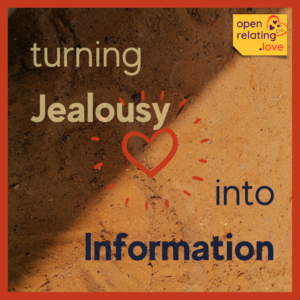 Turning Jealousy into Information (recorded April 2022)£10
Turning Jealousy into Information (recorded April 2022)£10 -
Product on sale
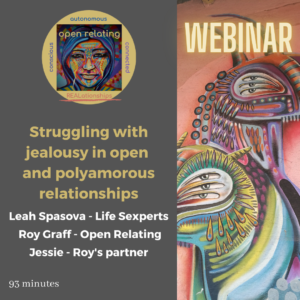 Struggling with Jealousy in Open and Polyamorous RelationshipsOriginal price was: £8.£0Current price is: £0.
Struggling with Jealousy in Open and Polyamorous RelationshipsOriginal price was: £8.£0Current price is: £0.




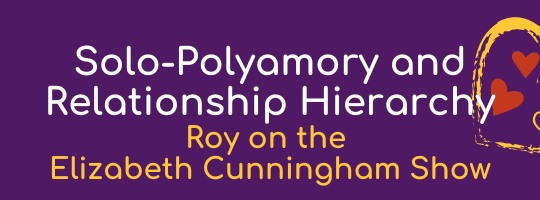
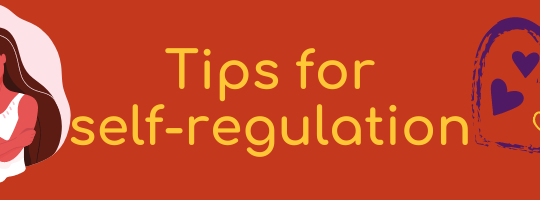
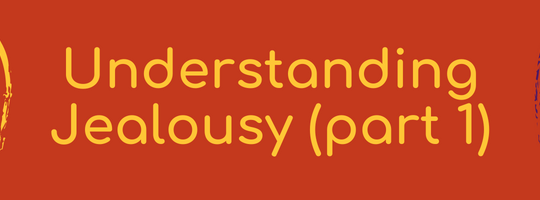
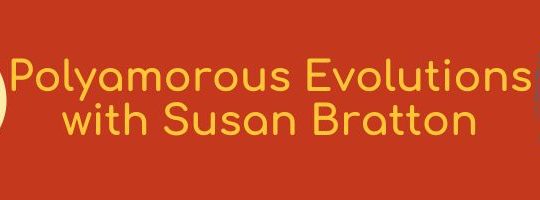
[…] Jealousy part 2: Between Love and Fear […]
[…] Read more in this article […]
[…] Jealousy part 2: Between Love and Fear […]